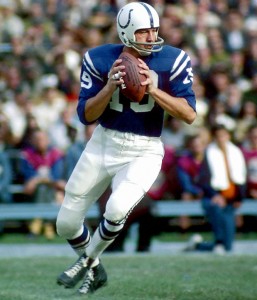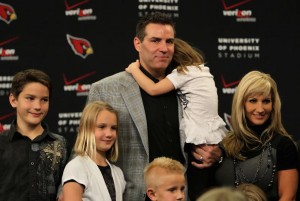Kurt Warner: Next Stop Canton
As word spread in recent days of the inevitable announcement by Kurt Warner of his retirement, I have been surprised by some questions of whether Warner deserves in the Pro Football Hall of Fame. Now that he has officially announced the end of his playing career, I have just one thing to say to those who question his place among the all-time greats: “Are You Crazy?”
I’m not looking to declare Warner among the 10 greatest quarterbacks of all-time (though a case could possibly be made for the lower half of that list), but there is no question that in five years time he will be taking his place among the immortals of NFL history.
In some ways, you could call Warner the modern day Johnny Unitas.
You may recall that after being rejected by his hometown Pittsburgh Steelers, Unitas spent time honing his skills on sandlot fields full of glass and rocks. He then made his way to Baltimore where an injury to starting quarterback George Shaw thrust the 23-year-old into the starting lineup during the 1956 season.
In his second season, Unitas led the Colts to their first winning record in the five year history of the franchise. The next season, Unitas led the Colts to a 9-3 record and their first NFL Championship in what has often been called the Greatest NFL Game Ever Played.
Unitas went on to win the NFL MVP Award three times and led the Colts to two NFL titles and a victory in Super Bowl V.

Much like Warner, Johnny Unitas went from obscurity to NFL greatness.
Statistically, Unitas was the greatest quarterback of his generation. At the time of his retirement, the 10-time Pro Bowler was the all-time leader with 40,239 passing yards and 290 touchdowns.
Fast-forward 25 years after Unitas played his last game and in 1998 Kurt Warner made his NFL debut as the backup quarterback for the St. Louis Rams.
After playing college football at Northern Iowa, Warner spent time stocking grocery store shelves while also spending three seasons playing in the Arena Football League and one season in the World Football League.
He played in one game in 1998 and seemed destined for another season as a backup when the Rams signed free agent quarterback Trent Green to be their starting quarterback for the 1999 season.
When Green went down to a season ending knee injury during preseason, head coach Dick Vermeil turned to the 28-year-old Warner and, as they say, the rest is history.
Warner quickly became the ringmaster for the “Greatest Show on Turf” as the Rams went from a 4-12 record in 1998 to a 13-3 record in 1999 and a spot in Super Bowl XXXIV. In that game, Warner passed for a record 414 yards while leading the Rams to victory in one of the most exciting Super Bowls in history.
The two-time MVP went on to lead the Rams to a second Super Bowl appearance two years later and was at the top of the football world.
However, his fall was as swift as his rise. In 2002 the Rams went 0-6 in games started by Warner as injuries started to impact the quarterback. The following season, he played in only two games and was done in St. Louis.
He signed with the New York Giants, but was unable to recapture his previous passing prowess and was replaced after only nine games by rookie Eli Manning.
Warner resurfaced with the Arizona Cardinals, but was only 3-12 in 15 starts over his first two seasons with the team.
In 2007, Warner was just 5-6 as the starter, but passed for 3,417 yards and 27 touchdowns for his best statistical season since passing for 4,830 yards and 36 touchdowns in 2001.
The Cardinals earned their first division title in 33 years and made a shocking run through the NFC to appear in their first Super Bowl.
Warner led the underdog Cardinals to within a whisker of the Super Bowl title as they lost to the Pittsburgh Steelers 27-23 in the final minute.
Even in defeat, Warner passed for 377 yards and three touchdowns while completing 72% of his passes.
Warner has the three highest passing yardage games in Super Bowl history and totaled 1,156 yards passing and six touchdowns in three Super Bowls.
When looking at cumulative career statistics, Warner does not compare with Unitas, Fran Takenton, Peyton Manning, Brett Favre, Dan Marino or some of the other quarterbacks at the top of the all-time career totals.
However, when you consider that Warner had only seven seasons in his career where he started 10 or more games in a season, his 208 touchdowns and 32,344 yards are actually pretty good.
Warner ranks sixth all-time in passer rating and second in career completion percentage. He eclipsed the 4,000-yard passing plateau in a season three times and also tossed 30 or more touchdown passes in a season three times.
Being a Hall of Fame quarterback is about more than compiling gaudy career statistics. There are quarterbacks who compiled great career statistics, but were never able to lift their team to championship caliber.

Warner will need all his strength to keep up with his busy family.
Warner not only produced some of the finest single season passing numbers in NFL history, but he also took his team to the next level.
There were only four seasons in his career during which Warner started 15 or 16 games in a season. Not coincidentally, Warner’s teams made Super Bowl appearances in three of those seasons and in the fourth (2009), reached the second round of the playoffs.
Consider that both the Rams and Cardinals were among the worst teams in the league before Warner arrived and led them to championship success.
Had injuries not hampered Warner throughout much of what should have been the formative period of his career, there is no telling just how great he could have been.
In addition to being a great player, Warner is also one of the great people in NFL history. He is considered a great teammate and apparently also a great father.
When Warner said during his retirement announcement that he was retiring to spent more time with his wife and seven children you got the sense that unlike some other players he really meant it.
Even though he is retiring after one of the best seasons of his career, you get the sense that Warner will not be the subject of comeback rumors next summer.
After a career filled with ups and downs, Warner knows when it is time to call it a career and appreciate the fact that he is relatively healthy considering the beating he took throughout his career.
Besides, with such a large family, Warner needs to be as healthy as possible just to keep up with the children.
So, while many players struggle with when it is time to say goodbye, Warner seems at peace with his decision and now will wait for history to decide where he fits in NFL lore.
In my opinion, his place will include a bust at the Pro Football Hall of Fame.

There really isn't any QB with a career comparable to Kurt Warner's — Joe Namath's may be the closest, and he's considered a marginal level HoF-er. Warner's career is short by HoF QB standards, and each year is either at feast or famine level. Six of his 11 seasons look to be at a varying degree of high level, but the rest are shortened, in some cases to only a couple games in each year. He did go to three Super Bowls, but only won one, so his postseason boost over Hall of the Very Good level isn't comparable to someone like Terry Bradshaw or Bobby Layne or Troy Aikman.
The notion that Warner's career is somehow comparable to that of Johnny Unitas is really hard to fathom, as Unitas has 11 high level HoF level years, plus 3 more at okay starter level and 4 partial seasons. Heck, Warner only played a total of 11 seasons. Plus Unitas was an AP 1st team all pro 5 times, went to 10 pro bowls, and is on the 60s all-decade team. Warner's count here is 2/4/none. Unitas has both a huge peak (both in duration and quality) and solid career longevity, and Warner can't match either here. And Unitas was the QB for a SB win (1970, along with Earl Morrall) and two NFL Championship Game wins (1958, 1959), plus he got to three other such games in which his team lost (1964 NFL Championship, 1968 and 1971 SBs). Unitas's total number of season-ending postseason games is twice that of Warner's.
It's entirely likely Warner will get voted into the HoF anyway, but if so, it will be because of his high if relatively brief peak, great back story, and media visibility.